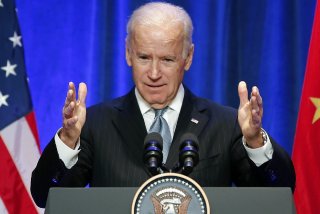If One More Stimulus Check Won't Cut It How About Every Month Forever?
Many are wondering if stimulus checks and tax credits will eventually turn into some form of universal basic income.
Here's What You Need to Remember: “The idea of the government providing a universal basic income for all adult citizens draws broad and intense opposition among Republicans, but is generally supported by Democrats,” according to a Pew Research Center survey conducted last summer.
Just last week, the Internal Revenue Service and the Treasury Department announced that 1.8 million more coronavirus stimulus checks were issued under President Joe Biden’s American Rescue Plan, raising the total number of checks sent out to one hundred sixty-seven million with a value of $391 billion.
But keep in mind that this is only the third round of stimulus, as Congress already had approved the delivery of two other direct cash payments to most eligible Americans—a $1,200 check in the spring of 2020 and $600 in December.
Against this backdrop and other government-issued funds currently on the way—such as the highly anticipated expanded child tax credits that will give eligible parents a $250 or $300 payment each month through the end of the year—many are wondering if these checks will eventually turn into some form of universal basic income (UBI).
UBI, which was the centerpiece of former Democratic presidential candidate Andrew Yang’s campaign, largely focuses on ensuring a minimum income level of all citizens, regardless of employment situation, so that they can financially meet basic standards of living. During his campaign, Yang pushed forward the idea of giving $1,000 to all American adults each month.
However, “the idea of the government providing a universal basic income for all adult citizens draws broad and intense opposition among Republicans, but is generally supported by Democrats,” according to a Pew Research Center survey conducted last summer.
“Nearly eight in ten Republicans and Republican-leaning independents (78 percent) oppose the federal government providing a universal basic income of about $1,000 per person, with 62 percent strongly opposed. A smaller share of Democrats and Democratic leaners (66 percent) favor a UBI, with just a third supporting the proposal strongly,” it continued.
Despite Republican resistance, other polls and studies are pointing to the fact that recurring payments are needed to financially assist millions of Americans who are mired in poverty. One such report released by the Economic Security Project has indicated that more rounds of stimulus checks have the potential to lift twelve million U.S. citizens out of poverty.
“Evidence from the last year shows stimulus checks to be the fastest and most impactful investments helping Americans get through this crisis, lifting more people out of poverty than any other single policy,” the report said.
Moreover, the recently released Inequality Index showed that U.S. economic inequality climbed to 6.5 percent in May, compared to 5.7 percent in April.
“Economic inequality increased in May as the impact of stimulus checks on households’ finances started to wear off faster than job growth could produce sustainable incomes for low- and middle-income adults,” the report stated.
Ethen Kim Lieser is a Minneapolis-based Science and Tech Editor who has held posts at Google, The Korea Herald, Lincoln Journal Star, AsianWeek, and Arirang TV. Follow or contact him on LinkedIn.
This article first appeared earlier and is being reposted due to reader interest.
Image: Reuters

